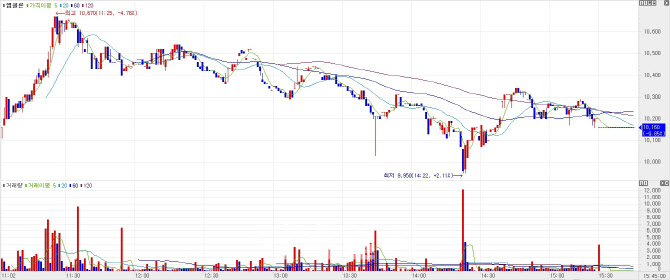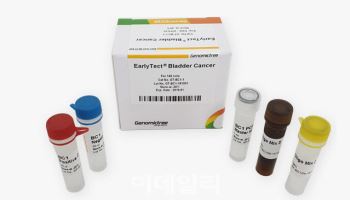Unauthorized reproduction or distribution is illegal and subject to criminal penalties.
Pharm Edaily enforces a zero-tolerance policy and will take strict action.
[NA Eun-kyung, Edaily Reporter] On May 12, biotech stocks claimed the top two spots in terms of gains on the KOSDAQ market. The biggest winners were Rokit Healthcare, which made its trading debut, and Caregen, known for its weight management supplement ProGsterol. Meanwhile, Abclon, which announced a strategic private placement with Chong Kun Dang(CKD Pharm) last week, saw its stock swing sharply before closing lower.
Abclon Wobbles Despite Strategic Investment from CKD Abclon opened at 10,700 KRW but fell to as low as 8,950 KRW by 9:30 a.m. The stock eventually closed at 10,160 KRW, down 9.84% from the previous session’s close of 11,270 KRW. This was the first trading day following the May 9 announcement of a strategic private placement with Chong Kun Dang (CKD) as the lead investor.
 | | Recent stock performance of Abclon (Source: KG Zeroin MP Doctor) |
|
A venture capital insider suggested the drop was due to short-term profit-taking by investors who had bought in at around 6,000 KRW in late March.
Through the deal, CKD becomes Abclon’s second-largest shareholder and gains priority marketing rights for Nespacell (AT101), Abclon’s CAR-T therapy candidate for blood cancers, in Korea. The companies plan to expand their collaboration to jointly develop and commercialize additional CAR-T and bispecific antibody therapies. Nespacell is currently in Phase 2 trials and aims to file for expedited approval within the year.
Industry sources see CKD’s investment as a strategic move to enhance its antibody development capabilities.
The deal is a major boost for Abclon, which has posted net pre-tax losses for the past three years. The new funding will allow the company to focus on R&D and help mitigate the risk of regulatory delisting due to continued losses.
Nevertheless, Abclon was newly added to the KOSDAQ’s administrative watchlist this year after reporting annual revenue below 3 billion KRW in 2024.
Caregen Hits Upper Limit on Hopes for License-Out and Obesity Treatment According to KG Zeroin’s MP Doctor platform, Caregen hit the upper daily price limit following the release of a pre-market analyst report by Hanyang Securities. The stock surged 30% to close at 30,550 KRW.
The report, titled “Time to Reflect the Value of Oral GLP-1 Supplement and AMD Drug”, suggested that Caregen may soon license out its first drug candidate, CG-P5.
CG-P5 is an investigational treatment for age-related macular degeneration (AMD), currently in a Phase 1 trial in the U.S. Final results from the trial are expected this July. Unlike approved therapies like Regeneron and Bayer’s Eylea, which are injected into the eye, CG-P5 is administered as eye drops?a key differentiator.
Analyst Byeongyong Oh noted, “Caregen is in discussions with multiple global companies for the license-out of CG-P5. The deal for the China territory appears to be in its final stages, and the company expects to sign a tech transfer agreement by June.”
Caregen is also developing Coglutatide, an oral GLP-1 analogue, as a health functional food rather than a pharmaceutical product. Results from a 12-week trial involving 100 participants are expected in June. Based on the findings, Caregen plans to license out regional distribution rights by the end of the year.
A company spokesperson said, “We are aiming to submit a New Dietary Ingredient (NDI) notification to the U.S. FDA by the end of this year.”
Rokit Healthcare Surprises on First Day of Trading Rokit Healthcare, which debuted on the KOSDAQ at 11,000 KRW per share, saw its stock surge 85% to a high of 20,350 KRW before closing at 14,750 KRW.
Founded in 2012, Rokit Healthcare is a regenerative medicine company utilizing AI-powered 3D bioprinters to create personalized tissue patches and bioinks. The company claims to have commercialized the world’s first personalized organ regeneration platform.
Rokit aims to expand the platform’s applications to indications such as skin cancer, burns, cartilage, and kidney conditions. Despite setting its IPO price at the low end of its target range (11,000?13,000 KRW) and posting the lowest subscription rate among KOSDAQ IPOs this year (80.44:1), its share price jumped 34.09% on debut, drawing market attention.
The company expects to begin generating revenue in skin cancer and cartilage applications in the second half of the year, with profitability as a key target for 2025. Proceeds from the IPO will be used to fund global marketing efforts in Europe and South America, confirmatory trials for its cartilage regeneration platform, and clinical studies for kidney regeneration.










